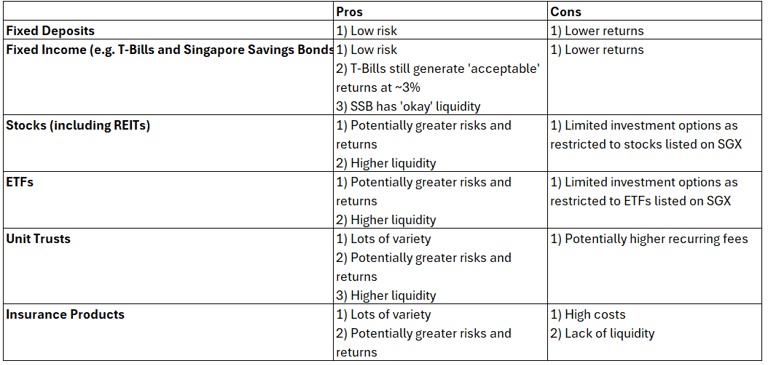Guide to Supplementary Retirement Scheme (SRS): Part 3
Now that you have contributed to your SRS account, what are the best SRS investment options?
PERSONAL FINANCEINVESTMENTSSRS
I've summarised the SRS investment options in the table above.
Fixed Deposits are low risk, but I do not recommend investing in them.
The same applies for fixed income options such as T-Bills and Singapore Savings Bonds. I do not recommend them as I think SRS should be invested for long-term gains, especially if you are young (~30 years old) and have a long investment horizon. Since SRS funds are illiquid to begin with, and are meant to be withdrawn during retirement, you should take more risks when investing SRS funds.
Equities are the answer if one is investing for a long horizon. However, SRS only allows for investments in SGX-listed stocks and REITs (if stock-picking). Most influencers out there advocate the use of a roboadvisor to purchase unit trusts tracking the MSCI World Index, or the S&P 500. I'm not a fan of this approach given the high costs involved.
My preference when it comes to investing SRS funds is to stock-pick SGX-listed stocks (or REITs). Alternatively, you can also consider ETFs listed on SGX; there are some decent ones.
I prefer using cash to invest in ETFs tracking the S&P 500; the liquidity is much better, and costs are much lower as well. SRS funds are used to invest in SGX-listed stocks (these stocks tend to pay higher dividends), which helps to diversify my portfolio.
Another way to think about it is that I run a growth strategy with my cash funds, and I run an income strategy with my SRS funds.
Conclusion
That's an overview of the SRS investment options!
Do bear in mind the limited investment choices of SRS funds, before contributing to your SRS account. If liquidity is very, very important to you, then I do not recommend contributing to SRS. Pay higher income taxes, and enjoy the freedom of using cash.
If you are in a position to worry less about liquidity, then do take advantage of SRS funds to reduce your income tax liabilities, and grow your pot of gold for retirement.
If you have any SRS related queries, feel free to reach out, and I will be more than happy to assist you in your SRS journey!


